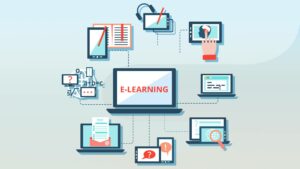
As we step into 2025, e-learning continues to evolve at an unprecedented pace. At LYADIS, a digital learning agency with 15 years of innovation and creativity under our belt, we have our fingers on the pulse of the trends driving this transformation. Here are the top 10 e-learning trends set to redefine how organizations educate, train, and empower their workforce.
1. AI Skills Acquisition: GenAI Leads the Charge
As generative AI (GenAI) technologies like ChatGPT revolutionize industries, organizations are increasingly prioritizing AI literacy and skills development. They are now focusing on teaching learners to use AI tools effectively, ethically, and creatively.
Why it Matters: AI fluency is becoming essential for professionals across all sectors. Empowering employees to harness GenAI can boost innovation and productivity.
2. Immersive Learning with VR & AR
Virtual Reality (VR) is progressively regaining ground in the learning field, but it is Augmented Reality (AR) that is now transforming training into experiential journeys. From immersive safety training modules to virtual customer service scenarios, learners can now practice skills in risk-free environments.
Why it Matters: Hands-on learning accelerates skill acquisition and enhances learner confidence.
3. Microlearning 2.0: Beyond Bite-Sized
Microlearning is evolving from simple video snippets to more interactive, context-rich formats. Think adaptive quizzes, AI-curated learning paths, and gamified scenarios delivered in minutes.
Why it Matters: This format aligns perfectly with shrinking attention spans and mobile-first consumption habits.
4. Templates for Rapid E-Learning Production
Creating e-learning courses has never been faster. Pre-built, customizable templates for various industries, skills, and roles are streamlining content creation while maintaining quality and engagement. Explore beautiful Adobe Captivate’s sample project library and widget library, along with powerful FLOWSPARKS’ pedagogical templates.
Why it Matters: Organizations can reduce production time, quickly adapt to changing needs, and deploy learning solutions at scale.
5. Data-Driven Learning Analytics
In 2025, learning doesn’t just happen- it’s measured meticulously. Advanced analytics tools provide insights into learner progress, course effectiveness, and ROI.
Why it Matters: Data-driven decisions help organizations optimize training strategies and maximize outcomes.
6. Edutainment: Blending Learning with Entertainment
Engaging storytelling, interactive video content, and gamification are transforming courses into edutainment experiences. Learners are no longer passive consumers but active participants. The term ‘edutainment,’ used as early as the 1950s by Walt Disney, refers to educating through entertainment.
Why it Matters: When learning is enjoyable, engagement soars—and so does knowledge retention.
7. Powerful Virtual Classroom Tools
The next generation of virtual classroom tools is making online learning more engaging and interactive than ever. Platforms like Adobe Connect offer real-time collaborative features, breakout rooms, multimedia integration, and advanced engagement tracking.
Why it Matters: Virtual classroom environments can closely replicate the dynamics of in-person learning, fostering active participation and collaboration.
8. Gamification: Real-Life, Real-Scale Engagement
Gamification has evolved far beyond points and leaderboards. In 2025, it integrates real-life scenarios, large-scale simulations, and story-driven challenges that reflect authentic job environments. Learners experience adventure-like training journeys while earning tangible rewards.
Why it Matters: When learners engage through realistic gamified scenarios, motivation soars, skills improve faster, and retention is significantly boosted.
9. Accessible E-Learning for All
Accessibility is a growing priority for e-learning solutions. From screen readers and keyboard navigation to closed captions and customizable interfaces, inclusive design ensures that everyone, regardless of abilities, can participate fully in digital learning.
Why it Matters: Accessibility creates equitable learning environments, fostering diversity and compliance with legal regulations like the WCAG (Web Content Accessibility Guidelines).
10. Sustainability in E-Learning
E-learning is becoming greener, with a focus on eco-friendly production methods and energy-efficient content delivery. Companies are also modernizing outdated courses to be more engaging and environmentally conscious.
Why it Matters: This approach helps reduce carbon footprints while reinforcing organizations’ sustainability commitments.
Final Thoughts
The e-learning landscape of 2025 is filled with opportunities for innovation and growth. At LYADIS, we help clients stay ahead by offering tailored solutions that integrate the latest trends into practical learning strategies.
Whether it’s content development, platform optimization, or full-scale implementation, we’re here to support you in achieving your learning goals.
Let’s explore how we can elevate your training approach. Reach out today to discuss your next steps.








